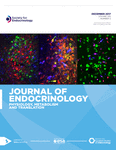Steroid sulfatase inhibitors for estrogen- and androgen-dependent cancers
- Oncology Drug Discovery Group, Section of Investigative Medicine, Imperial College London, Hammersmith Hospital, London W12 0NN, UK
1School of Clinical and Experimental Medicine, Centre for Endocrinology, Diabetes and Metabolism, University of Birmingham, Birmingham B15 2TT, UK
- (Correspondence should be addressed to P A Foster; Email: p.a.foster{at}bham.ac.uk)
Abstract
Estrogens and androgens are instrumental in the maturation of many hormone-dependent cancers. Consequently, the enzymes involved in their synthesis are cancer therapy targets. One such enzyme, steroid sulfatase (STS), hydrolyses estrone sulfate, and dehydroepiandrosterone sulfate to estrone and dehydroepiandrosterone respectively. These are the precursors to the formation of biologically active estradiol and androstenediol. This review focuses on three aspects of STS inhibitors: 1) chemical development, 2) biological activity, and 3) clinical trials. The aim is to discuss the importance of estrogens and androgens in many cancers, the developmental history of STS inhibitor synthesis, the potency of these compounds in vitro and in vivo and where we currently stand in regards to clinical trials for these drugs. STS inhibitors are likely to play an important future role in the treatment of hormone-dependent cancers. Novel in vivo models have been developed that allow pre-clinical testing of inhibitors and the identification of lead clinical candidates. Phase I/II clinical trials in postmenopausal women with breast cancer have been completed and other trials in patients with hormone-dependent prostate and endometrial cancer are currently active. Potent STS inhibitors should become therapeutically valuable in hormone-dependent cancers and other non-oncological conditions.
- Received in final form 4 August 2011
- Accepted 22 August 2011
- Made available online as an Accepted Preprint 22 August 2011
- © 2012 Society for Endocrinology











